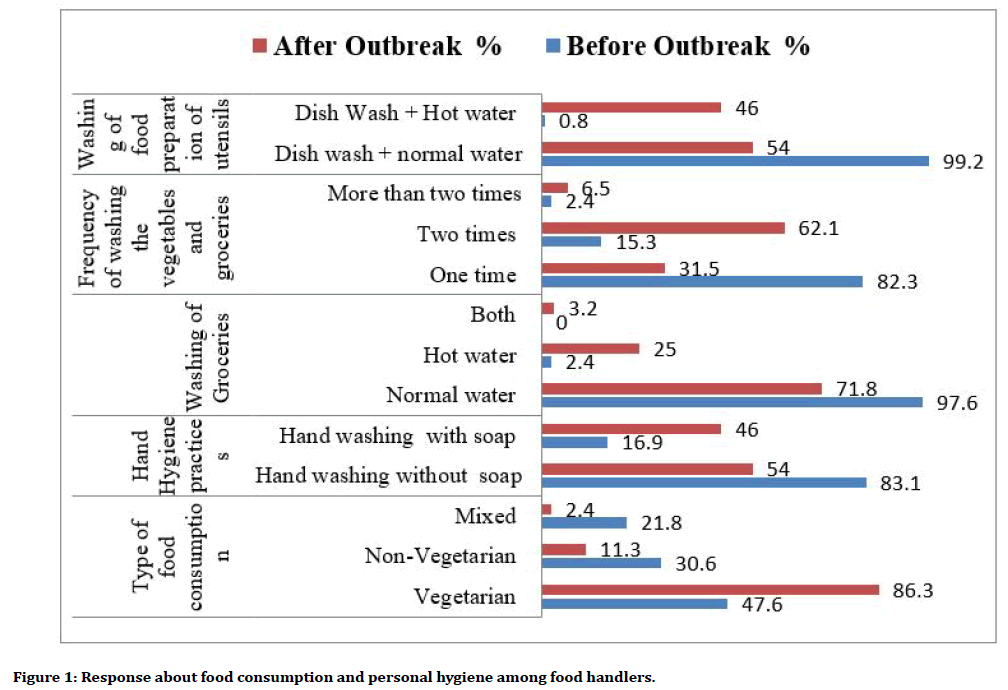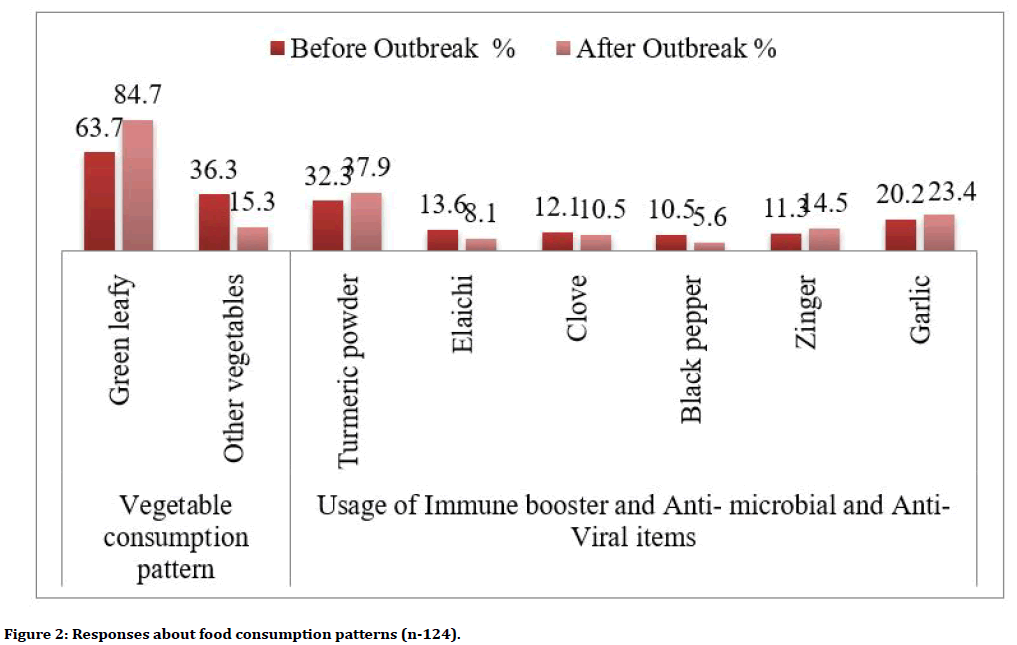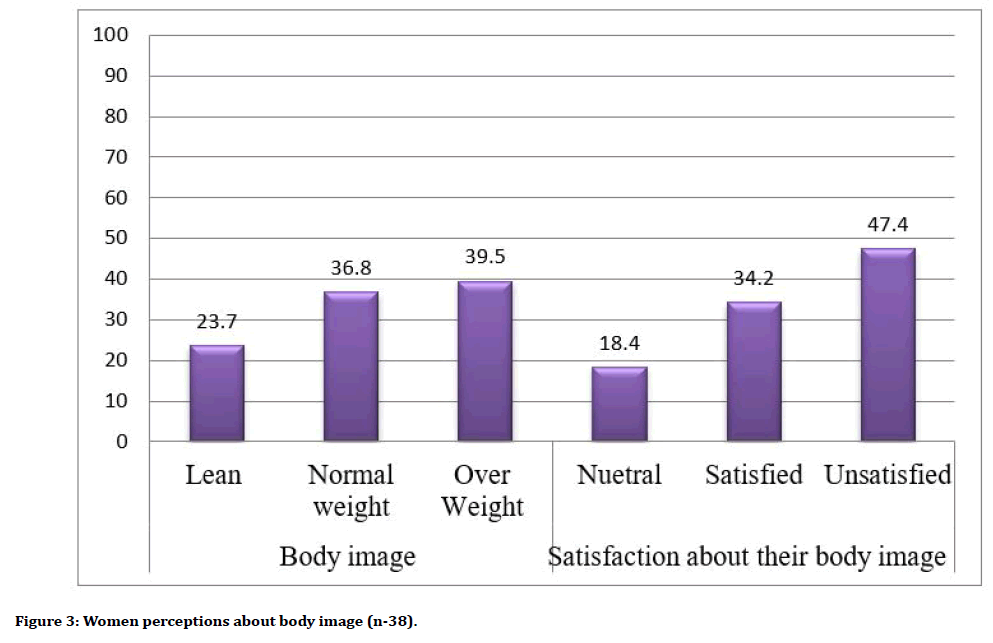Research - (2020) Volume 8, Issue 5
Food Consumption Pattern and Food Handlers Hygienic Practices During Covid-19 Outbreak Among South Indian Population
Gulappa Devagappanavar1*, Namitha MY2 and Rekha S Sonavane3
*Correspondence: Gulappa Devagappanavar, Department of Public Health, School of environmental Sciences, Public health and Sanitation Management, Karnataka State Rural Development and Panchayat Raj University, Gadag, India, Email:
Abstract
Background: Corona virus disease pandemic caused psychological, economic, and social problems among the mankind in worldwide. Because of this outbreak health, business, routine life, economy, education system, social and cultural practices are affected. Methods: Cross sectional study was conducted in the Gadag district headquarter and peri-urban area from 19th February 2020 to 13th March 2020 using semi-structured interview schedule. Convenient sampling technique method was adopted to obtain the data and data was analysed using SPSS v20, expressed in frequency and percentage. Results: Out of 124 participants majority (86.35%) of them are following vegetarian diet due to disease outbreak. 86.3% of them are washing their hands before food preparation. Most of them are started washing fruits and vegetables in hot water after corona virus disease outbreak. Nearly half (46%) of them are washing their utensils using dish wash bar along with water after this pandemic. Usage of turmeric powder (37.9%) and green leafy vegetable (84.7%) level is also increased. Conclusion: Study concludes that due to corona virus disease pandemic, people changed their food preparation and consumption practices to break the spread of infection through hand hygiene and cleaning practices.
Keywords
Hand Hygiene, Corona pandemic, Food consumption pattern, Food handlers, Impact of Covid-19
Introduction
Corona virus disease is spreading to the whole world very rapidly and threating the mankind. Whole world is shut downed because of this outbreak [1]. Food is the considerably basic requirement of the mankind. Eating food cannot be stopped as it causally related with the life of food. Along with this all the agricultural production, processing, marketing and distribution and allied sectors activities are also essential needs of the human being as they are causally related with the hunger [2]. So, purchasing agricultural commodity from the market cannot be stopped. At the same time fear of spread of corona virus pandemic through the commodity purchased is one of the risk factors. To overcome this risk, we can practice safe preparation and consumption pattern.
There are five steps to keep food safe. They are, keep clean, Wash hands before and after food preparation, separate raw and cooked food, cook thoroughly, keep food at safe temperature, use safe water and raw material [3]. Risk Communication and Community Engagement is an essential component of health emergency preparedness and response [4]. Proper hand hygiene practices will reduce the incidence of food borne illness [5]. Washing hands with sanitizer helps to kill the microbes present in hand. Washing fruits, vegetables and utensils with hot water helps to reduce the microbial load from the surface [6]. In this study we have assessed the change in the food preparation and consumption pattern of people after the covid-19 outbreak and women perceptions about the body image.
Methods
Study settings
A community-based study was conducted in the Gadag districts headquarter. Data was obtained during the February 19 /02 /2020 to 01/03/2020 by conducting the household survey.
Study design
A cross sectional study was conducted, data was obtained by convenient sampling technique. A semi structured interview schedule was used to obtain the data.
Participants
In the study, women were included to assess the current hygienic practices before and after the corona virus disease outbreak related to food handling and vessels cleaning. Those who are involving in the food preparation at house were included in the study.
Variables
Independent variables Socio-demographic variables such as age, gender, religion, marital status, education, and occupation. Dependent variables food consumption patterns and food handler’s hygienic practices before and after the covid-19 disease outbreak.
Sample size
As a part of corona virus disease thermal screening we were visited the many households in the Gadag headquarters, those who given the oral consent to participate in the study were included. A totally of 124 women were agreed to participate.
Data sources
Primary data was collected by visiting the houses and semi-structured interview schedule was administered to obtain the data.
Statistical analysis
Data was entered into excel sheet and analysed using SPSS v20, results were expressed in frequency and percentages.
Results
The study participants characteristics are majority were belonging to 51-60 age group and more than one third were belonging to religion Hindu and married. More than half the households are nuclear family and nearly half of them were unskilled worker (Table 1).
| Category | Characteristics | Frequency (%) |
|---|---|---|
| Age group | 20-30 | 21 (16.9) |
| 31-40 | 17 (13.7) | |
| 41-50 | 23 (18.5) | |
| 51-60 | 39 (31.5) | |
| 61 & Above | 24 (19.4) | |
| Religion | Hindu | 79 (63.7) |
| Muslim | 37 (29.8) | |
| Christian | 08 (06.5) | |
| Marital Status | Unmarried | 19 (15.3) |
| Married | 105 (84.7) | |
| Type of family | Nuclear | 89 (71.8) |
| Joint | 35 (28.2) | |
| Education | Professional | 07 (05.6) |
| Graduate | 21 (16.9) | |
| Diploma | 15 (12.1) | |
| High school | 12 (09.7) | |
| Middle school | 13 (10.5) | |
| Primary school | 47 ( 37.9) | |
| Illiterate | 09 ( 07.3) | |
| Occupation | Professional | 05 (04.0) |
| Semi-profession | 20 (16.1) | |
| Clerical / shop/ farm | 09 (07.3) | |
| Skilled worker | 07 (05.6) | |
| Semiskilled worker | 18 (14.5) | |
| Unskilled worker | 57 (46.0) | |
| Unemployed | 08 (06.5) |
Table 1: Socio-demographic details of the participants.
In this study it was found that consumption of vegetarian diet was increased drastically, and non-vegetarian diet is decreased. Proper hand washing before food preparation is also increased (86.3%). Usage of hot water for washing vegetables and groceries is increased to 25.0% and for cleaning of utensils usage of hot water along with dish wash bar is also increased (54.0%). Along with this people are washing groceries two times with water (62.1%) and 6.5% of people are washing their groceries more than 2 times (Figure 1).

Figure 1. Response about food consumption and personal hygiene among food handlers.
Consumption of green leafy vegetables is increased after the corona virus pandemic and meanwhile utilization of other vegetables is decreased. This may be because of lack of transportation for proper distribution of vegetables. Usage of Turmeric powder, Zinger and Garlic content is increased because of their anti-microbial, antioxidant and immune boosting properties. Curcumin, allicin and gingerol are the compounds which are responsible for the therapeutic effect of Turmeric, Garlic and Ginger, respectively. Usage of Elaichi, Black pepper and Clove content is slightly decreased during this pandemic (Figure 2). Only below 40 years age groups women were included. Only few expressed that they are over-weight followed by normal weight. Nearly half of them unsatisfied about their body image followed by people satisfied with their body image (Figure 3).

Figure 2. Responses about food consumption patterns (n-124).

Figure 3. Women perceptions about body image (n-38).
Discussion
In the study it was found that majority of the people changed their food habits from non-vegetarian to vegetarian diet due to Corona virus disease outbreak. Similar results were found in United states [7].
The study came out that majority of the food preparation women washed their hands without soap before food preparation. The similar findings were found in study conducted at rural areas of Bangladesh [8] and in Republic Korea [9].
Nearly half of them washed their hands with soap before food preparation, similar and interesting results were found in [10] and Canada [11].
One fourth of the women’s started washing the groceries in hot water, similar advice given by the food safety experts [12,13].
Due to covid-19 outbreak more than half of them started washing the vegetables and groceries more than one times to decontaminate of microorganisms and pesticide. A similar opinion and suggestion given by CFTRI Mysore [14] and USA agricultural marketing agency [15].
Washing of food preparation utensils also one of the best and important measures to prevent food borne diseases, in the current study nearly half of the women have washed their utensils in hot water with dish wash bar. A similar advice found in Texas from the food establishment organization [16] and same findings found in rural areas of Malawi [17].
Findings revealed that more than one third of the people started eating green leafy vegetable, the UNICEF organization also suggested to use the green leafy vegetable during this Covid-19 outbreak [18].
Due to covid-19 outbreak majority of them started eating immunity booster food items by adding them to food preparation. The similar suggestions found in study conducted at Thailand during respiratory disease outbreak [19].
Conclusion
Incidence of any pandemics affects the lifestyle practices of people. This study shows that people ’ s food preparation and consumption practices are changed due to corona virus outbreak. These changes had done by the population to avoid the spread of disease.
References
- Guan W, Ni Z, Hu Y, Liang W, Ou C, He J, et al. Clinical Characteristics of Coronavirus Disease 2019 in China. N Engl J Med. 2020;1–13.
- WHO. Coronavirus disease 2019 (Covid-19) Situation Report-58. World Heal Organ [Internet]. 2020;58(March):2633. Available from: https://www.who.int/emergencies/diseases/novel-coronavirus-2019
- Chaudhuri D. Food safety: A public health priority. Indian J Public Health. 2015;59(2):83.
- Fawzi M, Shama ME. Food Safety Knowledge and Practices among Women Working in Alexandria University, Egypt. J Egypt Public Health Assoc. 2009;84(1–2):95–117.
- Ismail FH, Chik CT, Muhammad R, Yusoff NM. Food Safety Knowledge and Personal Hygiene Practices amongst Mobile Food Handlers in Shah Alam, Selangor. Procedia - Soc Behav Sci [Internet]. 2016;222:290–8. Available from: http://dx.doi.org/10.1016/j.sbspro.2016.05.162
- Al-Beesh F, Al-Ammar W, M. Goja A. Assessing the Knowledge, Behavior and Practices of Food Safety and Hygiene among Saudi Women in Eastern Province, Saudi Arabia. Eur J Nutr Food Saf. 2019;10(3):178–86.
- K. M. Heraman, A.J.Hall LHG. Outbreaks attributed to fresh leafy vegetables, United States,1973-2012. HHS Public Access , Epidemiol Infect. 2016;176(1):139–48.
- Nizame FA, Leontsini E, Luby SP, Parveen S, Winch PJ, Ram PK, et al. Hygiene Practices during Food Preparation in Rural Bangladesh : Opportunities to Improve the Impact of Handwashing Interventions. Am J Trop Med Hyg. 2016;95(2):288–97.
- Lee M, Hong SJ, Kim Y. Handwashing with soap and national handwashing projects in Korea : focus on the National Handwashing Survey , 2006-2014. Epidemiol Health. 2015;37:1–9.
- Khanna D, Centre TM, Banerjee B. Health and Hygienic Parameters of Food Handlers and Sanitary Status of Food Establishments in a Medical College of Delhi. Indian J Community Med. 2019;14(March):65–6.
- Patrick Boshell. Hand hygiene and food safety. https://info.debgroup.com/blog/bid/226858/hand-hygiene-and-food-safety. 2013. p. 1–6.
- Schaffner D. Do You Really Have to Disinfect All Groceries Now ? An Expert Explains. https://www.sciencealert.com. 2020. p. 3–5.
- Shawn Radcliffe. Here ’ s How to Clean Your Groceries During the COVID-19 Outbreak. https://www.ecowatch.com/tag/food. 2020;
- Bhilwadikar T, Pounraj S, Manivannan S, Rastogi NK, Negi PS. Decontamination of Microorganisms and Pesticides from Fresh Fruits and Vegetables: A Comprehensive Review from Common Household Processes to Modern Techniques. Compr Rev Food Sci Food Saf. 2019;18:1004–38.
- Lehman BS. How to Wash Vegetables and Fruits Before Eating The Environmental Working Group ’ s Dirty Dozen. https://www.verywellfit.com/how-to-wash-fruits-and-vegetables-2505943. 2019;1–7.
- Rules TTFE. Cleaning Frequencies for Food Establishments. 2006.
- Chidziwisano K, Slekiene J, Kumwenda S, Mosler H, Morse T. Toward Complementary Food Hygiene Practices among Child Caregivers in Rural Malawi. Am J Trop Med Hyg. 2019;101(2):294–303.
- UNICEF. Easy , affordable and healthy eating tips during the coronavirus disease ( COVID-19 ) outbreak. 2020.
- Thailand medical news. Foods That Can Boost Your Immune System During Respiratory Viral Outbreaks ( Based On Clinical Studies ). https://www.thailandmedical.news/articles/coronavirus. 2020;1–38.
Author Info
Gulappa Devagappanavar1*, Namitha MY2 and Rekha S Sonavane3
1Department of Public Health, School of environmental Sciences, Public health and Sanitation Management, Karnataka State Rural Development and Panchayat Raj University, Gadag, India2Department of Food Science and Technology, Gadag Institute of Medical Sciences, Gadag, India
3Department of Community Medicine, Gadag Institute of Medical Sciences, Gadag, India
Citation: Gulappa Devagappanavar, Namitha MY, Rekha S Sonavane, Food Consumption Pattern and Food Handlers Hygienic Practices During Covid-19 Outbreak Among South Indian Population , J Res Med Dent Sci, 2020, 8(5): 141-145
Received: 25-Jul-2020 Accepted: 24-Aug-2020
